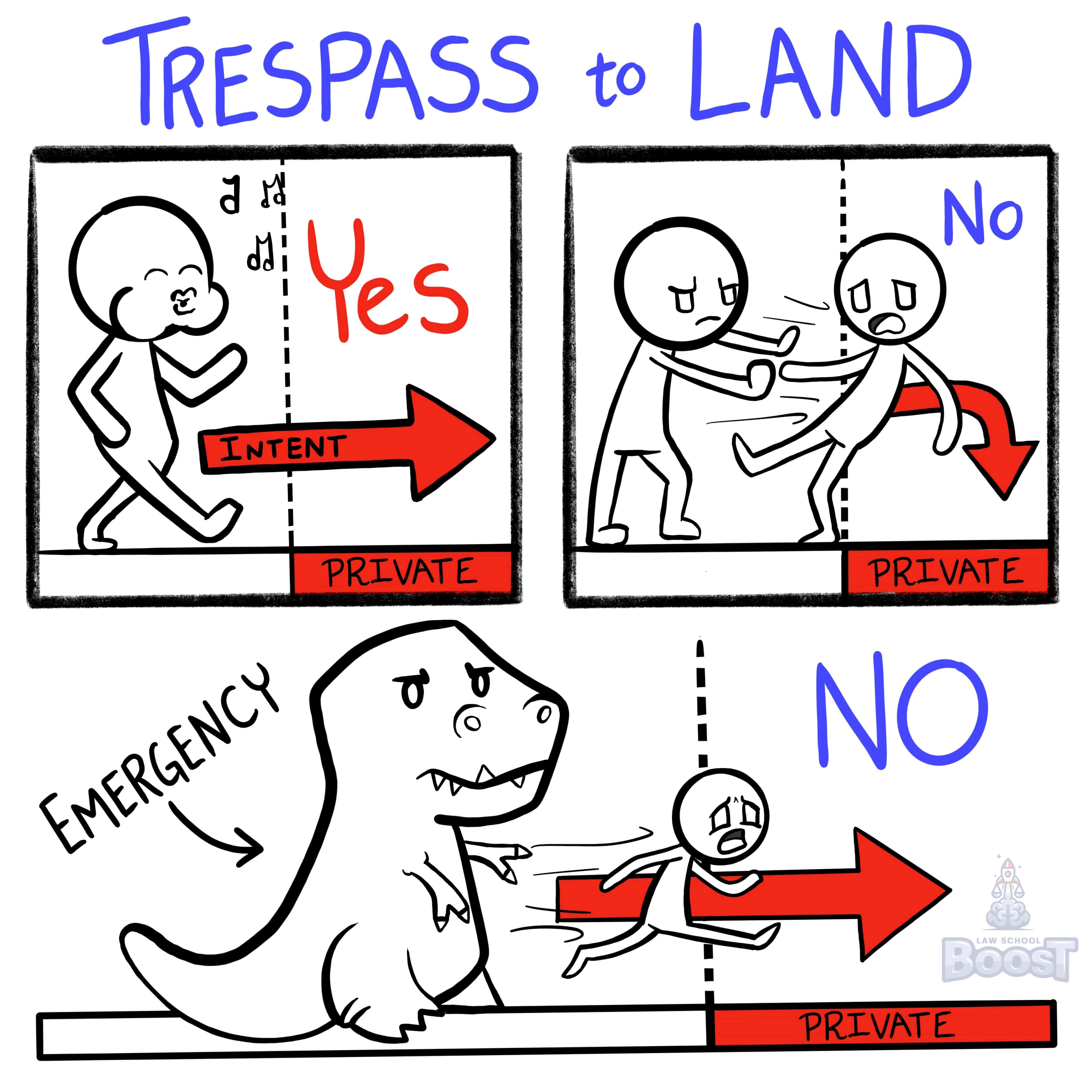👀
Torts • Intentional Torts
TORT#006
Legal Definition
Trespass to land is the intentional physical invasion of plaintiff's real property by one's person or a physical object.
Plain English Explanation
Trespass to land is as simple as someone entering onto (or placing an object onto) a piece of land owned by someone else. Since this is a <general intent> tort, the only intent required to satisfy the "intentional physical invasion" element is conscious control of one's body (or an object) to place it onto land of another (regardless of whether they are aware it is owned by anyone). This is usually where questions try to trick students.
For example, a person who accidentally or unknowingly walks onto someone's private property has committed a trespass (it doesn't matter that it was an accident, because they chose to move their body onto the land); however, a person who accidentally trips and then falls onto someone's private property has not committed a trespass, because they never intended to place themselves there.
For example, a person who accidentally or unknowingly walks onto someone's private property has committed a trespass (it doesn't matter that it was an accident, because they chose to move their body onto the land); however, a person who accidentally trips and then falls onto someone's private property has not committed a trespass, because they never intended to place themselves there.
Hypothetical
Hypo 1: Bob is in his backyard playing catch with his friend Carl. Bob throws the ball too hard and the ball flies over Carl's head, and over the fence onto Sam's yard. Result: No trespass has occurred, because Bob did not intend for the ball to go into Sam's yard.
Hypo 2: After Bob accidentally threw his ball into Sam's backyard, Carl climbs the fence to get it. Result: Carl has committed trespass on Sam's land, because he intended to enter it, and did without right to do so.
Hypo 3: Bob is in his backyard playing catch with his friend Carl. Bob is a jerk and wants to make Carl have to run far to get the ball, so Bob throws the ball into Sam's yard. Result: Bob has committed trespass on Sam's property.
Hypo 4: One day, Sam is walking down the street when suddenly a T-Rex appears. Sam flees for his life, and runs onto Bob's land to hide in his T-Rex-proof shed. Result: Sam has trespassed onto Bob's land, however (and as we'll discuss in another section), Sam has a valid defense of personal necessity, because it was a matter of life or death and the law is cool with letting people avoid things that may kill them if it means having to commit trespass.
Hypo 5: Bob invites his friend Carl over to visit his new house. He gives him the wrong address on accident. When he arrives to the house, he opens the front gate and walks up to the door. No one answers the door, so he walks around to see if he can see over the wall into the backyard. Result: Carl committed trespass, but when? He may have committed a trespass when he opened the gate to approach the front door, but generally people have the right to approach a front door unless a sign is posted to say otherwise. Such a sign ("no solicitation," or "private property - keep out") would have made such an approach trespass. Here, however, when Carl walked around the house to look over the fence, he very likely committed a trespass because he was now on private property without any implicit right to be (such as a walkway to the front door).
Hypo 2: After Bob accidentally threw his ball into Sam's backyard, Carl climbs the fence to get it. Result: Carl has committed trespass on Sam's land, because he intended to enter it, and did without right to do so.
Hypo 3: Bob is in his backyard playing catch with his friend Carl. Bob is a jerk and wants to make Carl have to run far to get the ball, so Bob throws the ball into Sam's yard. Result: Bob has committed trespass on Sam's property.
Hypo 4: One day, Sam is walking down the street when suddenly a T-Rex appears. Sam flees for his life, and runs onto Bob's land to hide in his T-Rex-proof shed. Result: Sam has trespassed onto Bob's land, however (and as we'll discuss in another section), Sam has a valid defense of personal necessity, because it was a matter of life or death and the law is cool with letting people avoid things that may kill them if it means having to commit trespass.
Hypo 5: Bob invites his friend Carl over to visit his new house. He gives him the wrong address on accident. When he arrives to the house, he opens the front gate and walks up to the door. No one answers the door, so he walks around to see if he can see over the wall into the backyard. Result: Carl committed trespass, but when? He may have committed a trespass when he opened the gate to approach the front door, but generally people have the right to approach a front door unless a sign is posted to say otherwise. Such a sign ("no solicitation," or "private property - keep out") would have made such an approach trespass. Here, however, when Carl walked around the house to look over the fence, he very likely committed a trespass because he was now on private property without any implicit right to be (such as a walkway to the front door).
Visual Aids



